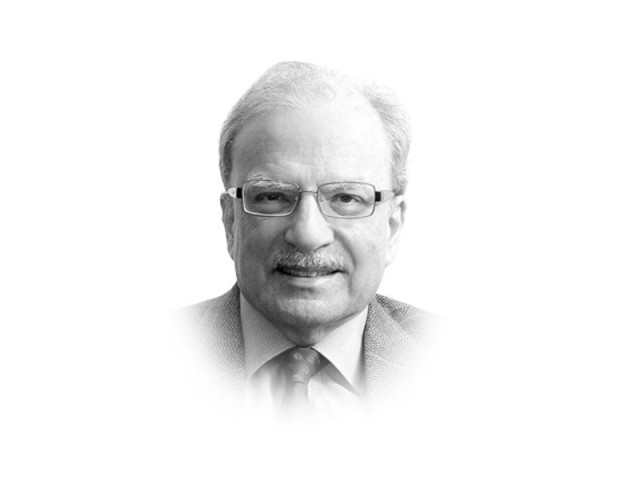Fallout in Afghanistan from Trump’s strong-arm tactics
This won’t work said the Taliban

The writer is a former caretaker finance minister and served as vice-president at the World Bank
Bill Clinton did not care much for Pakistan, although he used the country’s airspace to launch a missile attack aimed at killing Osama bin Laden who was then operating from Afghanistan. But bin Laden survived and on September 11th, 2001 with Bush as president, the Americans saw the Arab renegade launch terrorist attacks on New York and Washington that took 3,000 lives. Bush invaded Afghanistan, got the full backing of General Pervez Musharraf, now Pakistan’s president, and removed the Taliban regime that governed from Kabul. Though thrown out of Kabul, the Taliban succeeded in challenging the regime Washington and its allies had installed in Kabul. During eight years of the Barack Obama presidency, the Americans tried to withdraw their troops from Afghanistan, hoping to leave behind a relatively peaceful country. But they did not succeed, leaving Trump a problem that he does not seem able to resolve.
What Obama hoped would be a full disengagement from both Iraq and Afghanistan did not come about. When he left office, more than 8,400 American soldiers and 5,924 troops from Nato and other allies remained in Afghanistan. As Ben Hubbard and Michael Gordon wrote in The New York Times, “two months after the inauguration of President Trump, indications are mounting that the US military is deepening its involvement in a string of complex wars in the Middle East that lack clear endgames. Rather than representing any formal new Trump doctrine on military action, however, American officials say that what is happening is a shift in military decision-making.”
During the campaign for the presidency, Trump had promised to use force – a great deal of it – to wipe out Islamic extremists from the face of the world. He may have reversed himself on a number of other promises, made to excite his followers, but he has remained true to his word on Islamic extremism. What will be the consequences of this approach for the Muslim world at large?
Islamic extremists are operating at two levels. They have proclaimed the establishment of a caliphate that ultimately will have control over the entire Muslim world. Using Iraq and Syria as the initial base, they hope to spread out to other countries with a Muslim majority. Their other approach is to use modern means of communication to win support for their cause, especially among the communities of Muslims that, for a variety of reasons, are not happy with their environment. Force can eliminate physical presence but indoctrination will need an entirely different approach. In fact, the use of force may win the extremists more support.
According to one account in The New York Times, “much of Defence Secretary Jim Mattis’s plan to defeat the Islamic State, which Mattis delivered to the White House in February but has as yet to be made public, consists of proposals for speeding up decision-making to allow the military to move more quickly on raids, airstrikes, bombing missions and arming allies in Iraq, Syria and elsewhere.” The Pentagon had chafed at what many generals viewed as over-cautious micromanaging style of the Obama White House. The generals have embraced the new freedom, especially since several senior policy makers are from the military.
Within a few days apart there was the use of extreme force in two areas. On April 7th, Trump ordered the launch of 59 missiles on an airbase in Idlib province of Syria. The idea was to punish the government of Bashar al-Assad for the alleged use of chemical weapons against his own people. Six days later, on April 13th, the US dropped the GBU-43, the largest non-nuclear bomb in its arsenal, weighing 22,000 pounds, on the mountain hideouts in Afghanistan’s Nangahar province bordering Pakistan. According to General John W Nicholson, commander of the US forces in Afghanistan, the bomb was “the right weapon against the right target.” Its purpose was to remove the tunnel complex that housed hundreds of militants, most of them foreigners who had joined the ISIS affiliates in the area, known as the Islamic State of Khorasan Province. The fighters belonged to several countries including Uzbekistan, Pakistan, India and Chechnya. They had concentrated their effort since 2014 in the Achin district of the province, terrorising locals. Many of its 100,000 residents fled taking refuge in neighbouring Pakistan, creating another wave of Afghan refugees who already have a large presence in the country. In a statement issued a day after the strike, the Taliban called it “a show of force by the US forces that want to convince the world they are taking a strong stand against the Islamic State.” This won’t work said the Taliban, and they are possibly right.
Published in The Express Tribune, April 24th, 2017.
Like Opinion & Editorial on Facebook, follow @ETOpEd on Twitter to receive all updates on all our daily pieces.














COMMENTS
Comments are moderated and generally will be posted if they are on-topic and not abusive.
For more information, please see our Comments FAQ